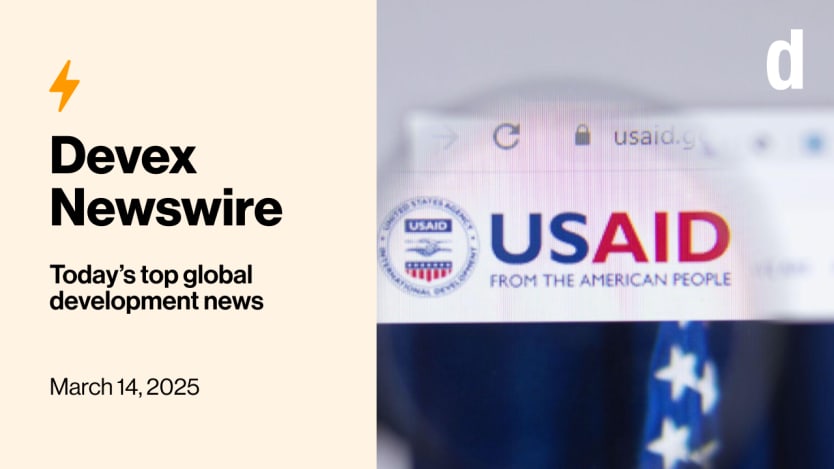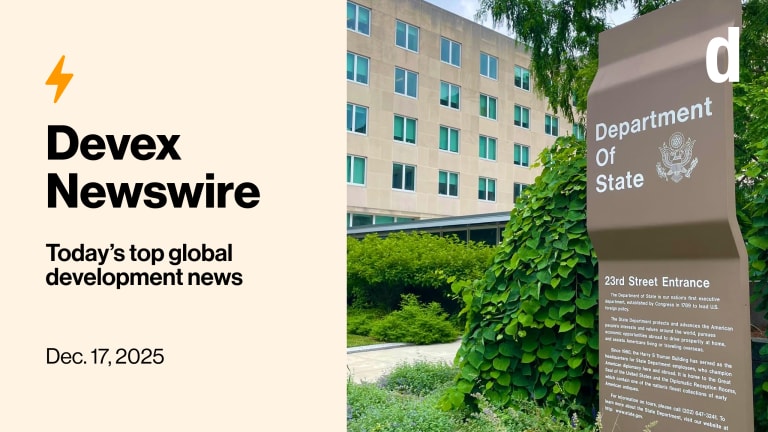
We were told the review process of USAID awards was over, but we weren’t told the full story. We have exclusive details about what’s going on — or, at least, as much as people can figure out about what’s going on.
Also in today’s edition: Exclusives on more cuts at two major U.N. agencies.
A foreign aid postmortem
A review of the reviews? Or is it different reviews stacked on top of each other? Honestly, it’s all a bit confusing, but perhaps my colleague Elissa Miolene puts it best when she wrote that the U.S. State Department and USAID are conducting a postmortem review process, though some things apparently are still getting lost in translation.
This is a preview of Newswire
Sign up to this newsletter for an inside look at the biggest stories in global development, in your inbox daily.
On March 10, U.S. Secretary of State Marco Rubio tweeted that he was officially canceling 5,200 USAID contracts, while sparing about 1,000, after a six-week review — but the numbers don't quite add up.
In court filings on March 3, the government said it had concluded its review, terminating 5,800 programs and sparing 500.
According to sources, USAID staff have been forced to review projects postmortem to make sure the number of awards they canceled match the figures tweeted out by Rubio. That means more questions — literally.
Questionnaires have been sent to both implementing partners and USAID staff — with the Office of Management and Budget calling those surveys a “foreign assistance review.”
On the partner side, organizations were asked questions such as whether they had worked with confirmed terrorist groups, if they encouraged free speech, whether they had received funding from China, Russia, Cuba, or Iran, and if they had an approach to transitioning projects off foreign assistance.
What organizations weren’t told was that every answer they provided would be scored on a scale of 0 to 5 and then fed into another survey conducted on the USAID side, where staff were asked to assess programs through another set of questions.
Confused? Elissa has you covered. Suffice it to say, not everyone is pleased.
“Why should I make up a justification for why you've already terminated an award?” says one USAID staffer, who was charged with going through the process this week and last. “I don’t know what your justification was, and I’m not going to do your work retroactively, backward, to give you a reason.”
Exclusive: Inside USAID's postmortem program review
🗓️ Join us on March 19 for an exclusive, unfiltered conversation with Dean Karlan, a former USAID chief economist. He’ll give insights on the economic implications of the aid cuts and program terminations and offer practical survival strategies for organizations in the current aid environment. Save your spot now.
This event is exclusively for Devex Pro members. Not yet gone Pro? We offer a 15-day free trial.
An uneasy restructuring
The United Nations is not exempt from the confusion. UNAIDS was among the thousands of organizations that received termination letters from the U.S. government — which accounted for about 41% of the agency’s revenue in 2023. It’s still unclear how many of its programs are affected and UNAIDS said it’s still gathering more details (join the club).
But staff are already bracing themselves as the U.N. agency kicks off a planned restructuring in response to donor funding cuts, my colleague Jenny Lei Ravelo reports.
During a town hall on Wednesday, senior management said they expect to complete a restructuring plan in the next two months and start implementing decisions in June, according to sources.
A staff member privy to the discussions tells Jenny that management has yet to present a formal blueprint or proposal on the restructuring, although some ideas have been floated, including reviewing UNAIDS’ geographic footprint, whether the same number of staff or functions are still needed in Geneva, and a further decentralization of the secretariat.
The source says management assured staff that U.N. procedures would be followed in the event of contract terminations, but some staffers say they’ve heard decisions have already been made, generating understandable anxiety. Some say the restructuring would result in job losses of up to 40% of staff at the UNAIDS secretariat.
“People are expecting some unpleasant, tough decisions from this exercise,” the staff member says.
Exclusive: UNAIDS staff anxious as restructuring looms amid aid cuts
A different kind of migration
The anxiety within the ranks of the United Nations is warranted. The U.N.’s principal migration agency has launched a new round of job cuts, with plans to lay off at least 20% of its staff at the agency’s Geneva headquarters and an unspecified number of dismissals in its overseas field offices, my colleague Colum Lynch exclusively reports.
The news of fresh cuts comes just weeks after the International Organization for Migration dismissed some 3,000 workers, decimating the agency’s U.S. refugee resettlement program. More cuts are anticipated in the coming weeks, according to humanitarian sources.
“Dozens have been told today they’re terminated/non-renewed. Entire units gone,” one source familiar with the situation tells Colum, estimating the layoffs could even be greater than 20%. “Massive loss of institutional & sectoral knowledge.”
The Trump administration’s foreign aid cuts have hit the Geneva-based migration agency particularly hard. IOM, which serves a population of over 280 million migrants, receives about 45% of its annual funding of more than $3 billion from the United States.
IOM staffers expressed “profound concerns regarding the recent Stop work Order, mass terminations, and their detrimental impact on both the refugees we serve and our dedicated colleagues,” according to an unsigned letter to the migration agency’s leadership seen by Devex.
“The rapid implementation of the suspension activities has put many refugees at risk of arrest and deportation,” the letter states. “Where is our accountability to the refugees we serve? The speed of these decisions has left no room for a responsible and phased transition, jeopardizing the well-being of those we are mandated to protect.”
Scoop: UN migration agency cuts more jobs, shutters lifesaving programs
ICYMI: UN migration agency sends out 3,000 pink slips in mass layoffs
Playing God
Beyond health and migration, food aid hasn’t escaped U.S. cuts unscathed. Like IOM and UNAIDS, the World Food Programme relies heavily on the U.S. for about half its budget. But the world’s largest humanitarian organization faced a painful budget crunch years before Trump would exacerbate that pain.
In 2023, WFP confronted the worst funding gap in its history, securing only $8.3 billion of the $23.5 billion it had requested, my colleague Ayenat Mersie writes. Meanwhile, the number of acutely food-insecure people worldwide has doubled since 2019.
“What I feel for, first and foremost, is the impact that this has on the vulnerable people on the ground because wherever you look — whether it’s Sudan, the Sahel, Yemen, Ukraine, Afghanistan, and the list goes on — this is just a very, very dire situation for the most vulnerable,” says Manoj Juneja, who was WFP’s chief financial officer for a decade before his retirement in 2023.
And ration cuts are forcing WFP to make wrenching ethical decisions about who gets food and who goes without, WFP’s Arif Husain tells Ayenat: “It’s not like there is a big difference between haves and have-nots … it’s barely any difference. We have to play God.”
Read: Already strapped for cash, WFP faces post-USAID future
🎧 Listen: For the latest episode of our podcast series, Ayenat and I join Devex Business Editor David Ainsworth to discuss the latest U.S. foreign assistance ruling and further unpack how the USAID cuts are affecting WFP.
‘Not a king’
Some organizations that implement USAID programs received memos this week stating the government must pay up. According to the memo, obtained by Devex, USAID told its partners the Trump administration must “not withhold payments” for work completed before Feb. 13 and that it's prohibited from “unlawfully impounding congressionally appropriated foreign aid funds.”
This comes in the wake of U.S. District Judge Amir Ali’s order on Monday that the Trump administration must pay USAID partners for billions of dollars in international aid work. The “decision affirms a basic principle of our Constitution: the president is not a king,” Lauren Bateman, an attorney with Public Citizen Litigation Group, said in response to the judge’s order.
Read: USAID implementing partners told government must pay up
Career curveball
Job losses are now a fact of life in the aid sector. Should you pivot? And if so, how? My colleague David Ainsworth spoke to career coach Simone Anzböck for advice on what to do if the rug has been pulled out from underneath you. First, she says, expect five big roadblocks:
Identity gap: Your job isn’t just a paycheck; it’s part of who you are. “Often our identity is associated with it. Our philosophy on life, our view of life, [and] the values we live,” she says.
Fear of the wrong move: It’s possible that a change of direction might take you in the wrong direction. But it might also be a chance to go the right way.
Job-title tunnel vision: Instead of chasing a title, focus on the skills you want to build.
Analysis paralysis: Too many choices? Trust your gut. As Albert Einstein apparently said: “The intuitive mind is a sacred gift.”
Living up to expectations: Don’t live someone else’s version of success. Be happy.
Anzböck offers suggestions for how to move past the roadblocks. Bottom line? Career pivots aren’t just about finding a new job — they’re about finding a better fit for you.
Read: How to make a career change in a rapidly changing environment (Career)
💼 A Devex Career Account membership gives you access to the article and other benefits such as timely reports analyzing development career trends, the full Devex job board, exclusive events for insights from top career coaches and sector leaders, and more. Start your 15-day free trial now.
In other news
Remaining USAID staffers were ordered to remove “gender-identifying pronouns” from their email signature blocks by 5 p.m. ET today. [Devex]
A Ugandan judge appointed to the U.N. International Residual Mechanism for Criminal Tribunals has been found guilty of engaging in slave labor by a U.K. court. [The Guardian]
A U.N. report released Thursday accuses Israel of committing sexual and gender-based violence in its destruction of maternal reproductive health care facilities in Gaza. [The New York Times]
Cases of measles in Europe doubled in 2024, according to WHO and UNICEF. [BBC]
Sign up to Newswire for an inside look at the biggest stories in global development.








